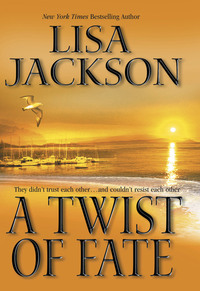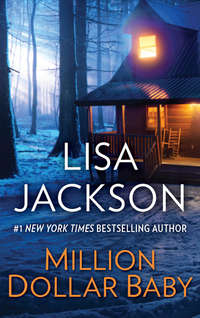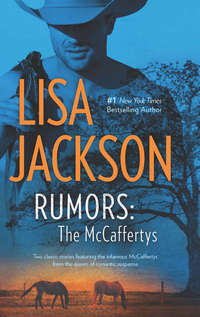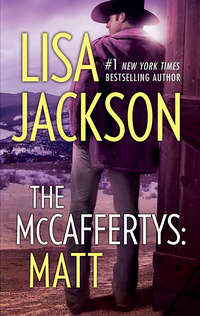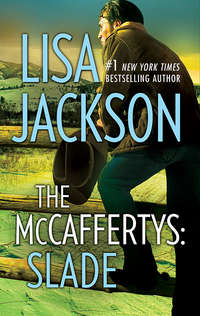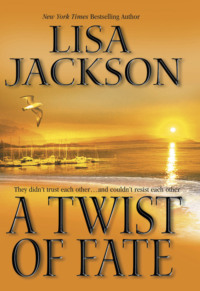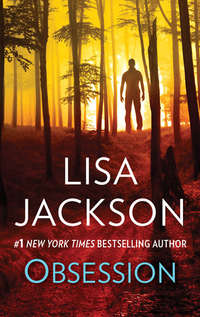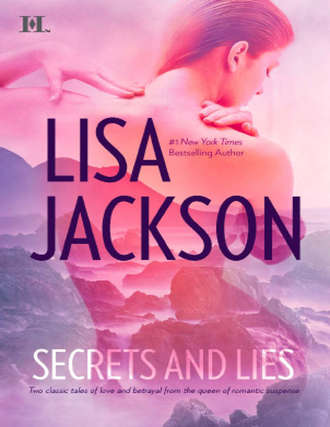
Полная версия
Secrets and Lies: He's A Bad Boy / He's Just A Cowboy
That’s when he’d left. And along with the government’s help and the money he earned working nights as a security guard, he’d made it through college and law school. He’d been hell-bent to prove to that damned town that he wasn’t just their whipping boy, that he had what it took to become successful. And every time a news camera captured him on film, he hoped all the souls in Gold Creek who had condemned him, could see that the bad boy had made good. Damned good.
He’d never wanted to go back. Until now. Because of Rachelle. Damn her for sticking her pretty neck out.
If he returned to Gold Creek, he’d have some explaining to do. Rachelle, no doubt, hated him.
Not that he blamed her. She had every reason to be bitter. From her point of view he’d used her, then left her to fight the battles—his battles—alone. He snorted in self-derision.
Yanking on his tie and loosening the top button of his shirt, he thought about the town where he’d been sired.
Gold Creek. A small town filled with small minds. No wonder he ended up here, where a person could be as anonymous as he wanted, one man in seven million.
He scanned the article one last time and noted that she’d written it while she was still in San Francisco. The column explained why she felt it necessary to return to that godforsaken hamlet.
She seemed to think that she had to tell the whole nation about her past, which, given the circumstances, was cruelly knotted to his in a noose of lies and sex and death. He smiled grimly at the ironic twist of fate, because by purging herself, she would be dragging him back and, perhaps, putting herself in danger.
Only he wouldn’t let her get away with it. Whether she knew it or not, Rachelle and her series were like a siren call to a place he wanted to forget.
He burned inside, thinking that she was manipulating him, forcing him to take a roller-coaster ride back in time.
Tossing back his drink, he knew what he had to do. It was something he should have done long ago. Now it was time to return to Gold Creek, to straighten out a past that had twisted his life for so many years, a past that had threatened his life, his career and his relationship with women; a past that had given him cause to become one of the toughest defense lawyers in the nation, his reputation tarnished or shining brightly depending upon which side of the courtroom a person favored.
He poured another drink, which he figured he owed himself, then checked the top drawer of his nightstand. His .38 was right where he’d left it, untouched, for six years. He picked up the gun, his fingers resting against the smooth handle. The steel was cold even in the heat of the bedroom.
Seeing his reflection in the mirror over the bureau, he cringed. His face had taken on the expression of a man obsessed by a single purpose.
Bad boy. Son of the town whore. From the wrong side of the tracks. Bastard. Murdering son-of-a-bitch.
The taunts and ridicules of the citizens of Gold Creek ricocheted through his mind, and his hands were suddenly slick with sweat.
He dropped the gun and slammed the drawer shut. Twelve years was a long time. Whoever had set him up for Roy Fitzpatrick’s murder was probably confident that his secret was safe. And even if the culprit were dangerous, bringing a handgun along wouldn’t help. He couldn’t walk back into town packing a gun. The .38 would stay, but Jackson would return to Gold Creek.
And when he did step onto California soil again, come hell or high water, he was going to find out what had happened on the night that had changed the course of his life forever.
Rachelle Tremont and her series be damned. She had no business putting herself into any kind of danger.
He picked up the telephone on the nightstand and dialed the number of his travel agent, the first move toward returning to California.
And to Rachelle: the last person he’d seen as he’d shouldered his few belongings and hitchhiked out of Gold Creek twelve years ago, and the first person he intended to lay eyes upon when he returned.
CHAPTER SIX
RACHELLE’S FIRST DAY IN Gold Creek wasn’t all that productive. She’d spent hours unpacking and settling into the cottage where she’d grown up, the cottage her mother and Heather still owned. At present no one was renting the little bungalow, so Rachelle and Java moved in, cleaned the place and fought back memories that seemed to hang like cobwebs in the corners.
It was night before she donned her jacket and drove into town. Her first stop was the high school. She parked in front of the building and ignored the race of her heart.
Red brick and mortar, washed with exterior lights, Tyler High rose two stories against a star-spangled backdrop. The sharp outline of a crescent moon seemed to float on a few gray wisps of clouds that had collected in the sky.
Memories, old and painful, crept into her mind and she wondered again about the wisdom of returning to a town where she’d been born, raised and humiliated.
Steady, she told herself, and plunged her hands deep into the pockets of her jacket. Muted music and laughter, seeping through the open doors of the Buckeye Restaurant and Lounge, rode upon an early summer breeze, diminishing the chorus of crickets and the soft hoot of an owl hidden high in the branches of the ancient old sequoias that guarded the entrance of the school.
She remembered the taunts of the other kids—the clique of girls who would giggle as she passed and the boys who would lift their brows in invitation. Her senior year had crawled by and when it was over, she’d worked the summer at a newspaper in Coleville and started college the following September. She’d refused to think about Jackson, for, after eight months of thinking he would return for her, she’d finally accepted the cold, hard fact that he didn’t care for her.
Harold Little, her mother’s second husband and a man she could hardly stomach, had lent her money to get through school. After four years at Berkeley, long hours working on a small, local paper and few dates, she’d graduated. With her journalism degree and her work references, she’d found a job at one small paper, and another, finally landing a job at the Herald. Her column had been well received and finally she felt as if she’d made it.
But not as big as had Jackson. Even now, standing in front of the school, she remembered the first time she’d seen him on television. His face was barely a flash on the screen as the camera panned for his famous client, a famous soap-opera actress whose real life paralleled the story line on her daytime drama.
Rachelle had dropped the coffee cup she’d been carrying from her kitchen to the den. The television set, usually on, was muted, but she couldn’t forget Jackson’s strong features, his flashing dark eyes, his rakish, confident smile, the expensive cut of his suit.
She’d heard that he’d become a lawyer and it hadn’t taken him long to move to New York and earn a reputation. But seeing his face on the television screen had stunned her, and in a mixture of awe and disgust, she’d watched the screen and mopped the coffee from the floor. From that point on, she’d kept up with his career and wondered at his chosen path.
He’d never contacted her in twelve years. He probably didn’t even remember her name, she thought now, alone in the dark. And yet she’d promised her editor she’d try to interview him by calling him in New York. What a joke!
* * *
GOLD CREEK HADN’T changed much.
Jackson drove his rental car through the night-darkened streets. Yes, the homes sprawled closer to the eastern hills than they had twelve years before and a new strip mall had been added to the north end of town. A recently built tritheater boasted the names of several second-run movies and, as expected, a lot of the real estate and businesses were tagged by the name Fitzpatrick.
“Some things never change,” he said, thinking aloud as he passed yet another home offered for sale by Fitzpatrick Realty.
Fitzpatricks had always run the town. The first Fitzpatrick had discovered gold here and his descendants, too, had made a profit from the natural resources the hills offered and from the strong backs of other able bodies in town. From the early 1900s, when Fitzpatrick Logging had opened up wide stands of fir and pine in the foothills surrounding Gold Creek until now, Fitzpatrick Logging had been a primary employer of Gold Creek. Millions of board feet of lumber had translated into hundreds of thousands of dollars for the first timber baron in the county’s history, and George Fitzpatrick had become a millionaire. His wealth had been passed on from generation to generation, spreading like some unstoppable disease until the majority of townspeople worked for Thomas Fitzpatrick, grandson of George and father of Roy, the boy Jackson had been accused of murdering twelve years before.
Fitzpatrick Logging. Fitzpatrick Realty. Fitzpatrick Hardware. Fitzpatrick Development. Fitzpatrick Building Supplies. Everything in the town seemed to be a shrine to the influence and wealth of the Fitzpatrick family.
Jackson’s hands tightened over the wheel of the Buick as he cruised past a local pizza parlor, thankfully named Lanza’s. As far as Jackson knew, Thomas Fitzpatrick and his ancestors didn’t have any Italian blood running through their veins.
He guided the Buick to a stop at the park situated in the middle of town. This little scrap of ground, less than an acre, was a far cry from Central Park in the heart of Manhattan, but Gold Creek was no New York City, he thought with a trace of sarcasm. Despite its problems, New York held more appeal.
Jackson climbed out of the car and stretched his legs, eyeing the surroundings. The hair lifted on his arms as he spied a gazebo that stood in the center of the green where several concrete paths met. The gazebo was larger than the lattice structure he remembered at the Fitzpatrick summer estate, but still, his skin crawled.
The walkways, illuminated by strategically placed lampposts, ran in six directions, winding through the trees and playground equipment of one square block of Gold Creek. The grass was already turning brown, and the area under the swings and teeter-totters was dusty. Flowers bloomed profusely, their petals glowing in the white incandescence of the street lamps. A few dry leaves, the precursors of autumn, rustled as they blew across the cracked concrete.
But the air was different from the atmosphere in New York City. In Manhattan, he felt the electricity, the frenetic pulse of the city during the day as well as the night. But here, practically on the opposite shore of the continent, the pace was slow and low-key. No one appeared in the dusky park, and the wattage of energy seemed to simmer on low.
Shoving his sleeves over his elbows, he made his way to the gazebo and read a carved wooden sign that noted that the park was dedicated to Roy Fitzpatrick, and listed his date of birth and death, a bare nineteen years apart. Ironic that the shrine for Roy had been a gazebo, similar in design to the gazebo on the Fitzpatrick property at the lake—the very spot where Roy had tried to force himself on Rachelle. Jackson’s jaw grew hard. He supposed he should feel some pity for Roy, but he didn’t. Though he’d never wished Roy dead, the kid had rushed headlong into tragedy. Roy had taken what he wanted, had felt no remorse and had believed that excess was his due.
No wonder someone had objected. It was just a shame that Roy had died. He ran his fingers over the inscription and wondered for the millionth time who had killed Roy. Probably someone they both knew, some coward who had let Jackson hang, twisting in the wind, for the murder. How far would the killer have let him go? If the case had gone to trial, if, by some fluke, Jackson had been convicted, would Roy’s murderer have come forward? He doubted it. Whoever had killed Roy had been more concerned about covering his tracks than letting justice prevail.
But Jackson hadn’t been indicted and he’d run. Like a jackrabbit escaping a coyote, he’d decided to run as far as he could and start a new life. Without any ties to Gold Creek. Without Rachelle. And he’d created that life for himself through hard work, determination and luck—something that was in short supply here in Gold Creek.
And now Rachelle was going to dig through the dirt all over again. Though her column hadn’t said that was her intent, Jackson knew that the old scandal wouldn’t stay buried, not with the ever-widening specter of dominion that was the Fitzpatrick family. It was time to settle this, once and for all. Before anyone—especially Rachelle—got hurt.
And Rachelle? How does she fit into the plan? He glanced up to the diaphanous clouds skirting a slit of a moon. He’d tell her to lay off, threaten her with some kind of fictitious libel suit, then leave her alone.
He only hoped she had enough sense to take his advice. He didn’t really give a damn if she wanted to let the nation see the small town where she’d grown up, but he didn’t want her fouling up his own reasons for being here.
Yes, she’d been the catalyst that brought him to the sunny state of California, but he wanted her to concentrate on the daily lives and anecdotes of the people in her town, and he wanted her to stay the hell away from the night that Roy Fitzpatrick died.
Roy’s death was Jackson’s business. Unfinished business that he intended to finally take care of. He didn’t need Rachelle unwittingly stepping into danger.
Now all he had to do was find her. There were a couple of motels in town that he would check out and he knew the little house where she’d grown up. He’d start there.
* * *
RACHELLE TOOK A SIP FROM her tea and nearly burned her lips on the hot mug. “Blast it all,” she muttered at the microwave she had yet to master. The house had changed in the past twelve years, as had her life. New coats of paint gleamed on the walls, the kitchen cabinets had been refinished and soft new carpet spread like a downy blanket over the battered linoleum floors. She could thank her sister, Heather, as well as Heather’s money, for the restoration of this place. Heather had, for their mother’s sake, invested in this house after their mother had decided she wanted to rent an apartment in the heart of town, closer to the man who was now her husband, Harold Little. Rachelle frowned at the thought of Harold. She’d never liked the scrappy, flat-faced man.
But Heather, God bless her stubborn streak, had tried to help their mother. She’d thought Ellen needed to meet other people, get on with her life and quit stewing over the fact that her husband had left her over a decade before. Rachelle had agreed, and Heather, confiding that she planned to let the tide of California inflation buoy the value of the cottage into the stratosphere, had bought the house. The plan had been great until the recession had hit and the tidewaters of big money had ebbed dismally.
Cradling her tea, Rachelle padded barefoot back to the small bedroom. Aside from a few clothes, her cat, Java, and her laptop computer, she hadn’t brought much with her. Setting her mug onto the nightstand, she kicked a small pile of dirty laundry toward the closet.
She flopped onto the bed, the laptop propped against her knees and Java curled at her feet on the rumpled bedspread. This little room with its blond twin beds and matching dresser had been the girls’. The bulletin board was long gone, taken down in her senior year when her blackened reputation had made each day at Tyler High a torture and any reminders of high school had been burned, tossed out or locked in the attic.
Her dark thoughts shifted to the friends who had turned their backs on her, who had since become stalwart citizens of the town: teachers, bankers, waitresses and even a doctor who had avoided her. Now they were parents themselves, married, divorced, their lives as changed from their carefree days in high school as hers had been. She set her fingers on the keypad and started on her column, entitling it “Faded Flowers,” and imagined interviewing the people who had shunned her.
Shivering, she picked up her mug, nearly sloshing its contents over the bed when the doorbell pealed. Java leapt off the bed and crawled beneath the dust ruffle.
“Chicken,” Rachelle chided the cat. She set her drink down and walked quickly through the hall. “Coming!” she called toward the door, then noticed from the antique clock on the mantel that it was after ten. Aside from her mother, or possibly Heather if the whim struck her, no one would visit.
Flipping on the porch light, she peered through the narrow window next to the door—and froze, her spine tingling coldly. She’d been thinking of him tonight, yes, and not kindly. But she couldn’t believe he was here, a handsome ghost of her past returned to haunt her! Her tongue clove to the roof of her mouth, and her heart nearly stopped as her eyes glued to the hard-edged features of Jackson Moore.
Time seemed to stand still. Rachelle’s skin was ice as Jackson’s inflexible brown gaze moved to the window to land full force upon her.
Her throat turned to cotton at the hard line of his lips, the tension in his jaw. He didn’t smile or frown, and she knew instinctively that he wasn’t pleased to see her.
Twelve years of fantasies shattered in that single second. For even though she’d told herself she hated him, that the mere sight of him on the news reports turned her stomach, a stupid little feminine part of her had wished that he still cared. From the intensity of his features and the unspoken anger in his glare, she’d been wrong about him. Shame washed up her neck as she realized, not for the first time, that the town, this damned town, had been right! She’d been a worse fool than even she had thought.
Obviously she’d meant nothing more to him than a one-night stand and an easy alibi for Roy Fitzpatrick’s murder. It took all the strength she had to throw the dead bolt and open the door.
A night breeze crept past him, stealing into the room.
“I thought you were in New York,” she said defensively, her reticent tongue working again. She decided she’d better set things straight before he had a chance to say anything. “Isn’t that where you live now, righting all the wrongs against your innocent clients?”
His eyes glittered, and the whisper of a smile caught the edges of his mouth for just a second. “I didn’t come here to talk about my practice.”
“Just in the neighborhood?” she taunted, wanting to wound him and give him just a taste of the pain she’d suffered when he’d abandoned her. All those years. All those damned years!
His thin lips shifted. “Actually, I came to see you.”
“A little late, aren’t you?”
Did he wince slightly, or did the shadow of a moth flutter by the porch light, seeming to change his expression for just a second? “I guess I deserved that.”
“What you deserve I couldn’t begin to describe,” she replied. “But phrases like ‘drawn and quartered,’ ‘boiled in oil’ or ‘tarred and feathered’ come quickly to mind.”
“You don’t think I suffered enough?” he asked, crossing tanned arms in front of a chest that had expanded with the years. He was built more solidly than he had been: broader shoulders, still-lean hips, but more defined muscles. Probably the result of working out with a private trainer or weight-lifting or some such upper-crust urban answer to aging. There wasn’t an ounce of fat on him and he looked tougher in real life than he did on camera.
“You didn’t stick around long enough to suffer,” she said.
“What would that have proved?”
That you cared, that you didn’t use me, that I wasn’t so much the fool… . “Nothing. You’re right. You should have left. In fact, I don’t know why you’d want to come back here at all,” she admitted, some of her animosity draining as she stared at his sensual lower lip. Steadfastly, she moved her gaze back to the hard glitter in his eyes.
“I returned for the same reason you did,” he said slowly.
“And why’s that?”
“To settle things.”
“Is that what I’m doing?” He was gazing at her so intently that her heart, which was already beating rapidly, accelerated tempo. Emotions, as tangled and tormented as they had been twelve years before, simmered in the cool night. The sound of traffic from the freeway was muted, and the wind chimes on her porch tinkled softly on a jasmine-scented breeze.
“I take the New York Daily,” Jackson said, his hands in the back pockets of his black jeans. “It carries your column.”
She waited, expecting more of an explanation, and avoided looking into his eyes. Those eyes, golden-brown and penetrating, had been her undoing all those years ago. She’d trusted him, believed in him, and it had cost her. Well, she wouldn’t let his gaze get to her again. Besides, he couldn’t. There was a new jaded edge to him that she found not the least bit appealing.
“I read that you’re doing a series about Gold Creek.”
“That’s right.” Her gaze flew back to his and she straightened her shoulders, determined to deal with him as a professional. An interview with Jackson Moore would be a coup, an article her editor, Marcy, expected, but Rachelle couldn’t imagine talking with him, taking notes, probing into his life as it had been in Gold Creek all those years ago.
“I think we should discuss it.”
“Discuss it?” she repeated, her backbone stiffening as if with steel. “Why would you want—?” She cut herself off, and, folding her arms over her chest, propped one shoulder against the door. “What’re you doing back in Gold Creek?”
His eyes bored deep into hers and she realized suddenly what it must feel like to be a witness squirming on the stand while Jackson, slowly, steadily and without the least bit of compassion, cut her testimony to shreds. “I think you’re about to get yourself into trouble, Rachelle,” he said. “And I want to make sure that you don’t get hurt.”
She laughed. “I don’t need you to protect me. And there’s nothing to be afraid of, anyway.”
“You don’t know what you’re getting into.”
“I do. And if you’re talking about the Fitzpatrick murder, I was there, too. Remember?” Deciding she was probably exercising a blatant error in judgment, she kicked the door open wider. “Why don’t you come in and say whatever it is that’s on your mind?”
“Off the record?” he asked.
“Afraid of what I might write?”
“I’ve been misquoted before.” She thought of the past six years and his meteoric rise to fame, or infamy. He hadn’t been afraid of taking on the most scandalous of cases, many involving the rich and famous, and he’d managed to see that his clients came out smelling like proverbial roses.
One woman, an up-and-coming actress who had a reputation with men, had been accused of shooting her lover after he’d been with another woman. Jackson had come up with enough blue smoke and mirrors to confuse and cloud the issue, and the actress, Colleen Mills, had walked out of the courtroom a free woman. Though the press had tried her in the newspapers and the evidence had been overwhelmingly against Colleen, she was now in Hollywood working on her next film. Rumor had it that she was giving an Oscar-worthy performance, as she had, no doubt, on the witness stand under Jackson’s direction.
He walked into the house and she closed the door after him. He didn’t look like a hotshot New York attorney in his faded black Levi’s, boots and T-shirt. A leather jacket—black, as well—was thrown over one shoulder and she wondered sarcastically if he’d joined a motorcycle gang and roared up on his Harley.
She almost smiled at the thought and realized that he looked much the way she remembered him, though his features had become leaner, more angular with the years. His hair was still on the long side, shiny black and straight, and his eyes, golden-brown and judgmental, didn’t miss a trick. Even the brush of thick lashes didn’t soften his virile male features. His gaze swept the room in one quick appraisal and probably found it lacking.
“It’s late. Why don’t you get to the point?” She perched on the rolled arm of the old overstuffed couch.


